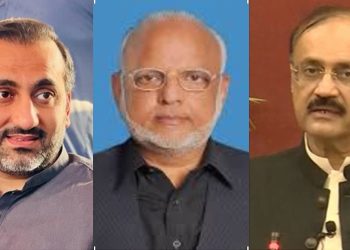ISLAMABAD: Pakistan Tehreek-e-Insaf (PTI) leader and former federal minister Faisal Vawda on Friday challenged his lifetime disqualification from Parliament in the Supreme Court.
Vawda moved an appeal in the apex court after the Islamabad High Court dismissed his plea against the Election Commission of Pakistan’s (ECP) to disqualify him for life after he failed to disclose his nationality while contesting the 2018 general elections.
In the petition submitted through his lawyer, Vawda contended that the commission had no power to disqualify any politician for life as it was not a court of law. He said the IHC dismissed his petition against his disqualification in haste and pleaded to set aside the ECP decision of disqualifying him for a lifetime.
An ECP bench, led by Chief Election Commissioner Faisal Sultan Raja, had disqualified Vawda on Feb 9 for concealing his dual nationality and instructed him to return the salary and other perks received as a minister and MNA within two months. He was subsequently de-notified as a senator.
The ECP has announced the schedule for election on the Senate seat vacated after Vawda’ disqualification. According to the ECP, polling for the vacant senate seat will be held on March 09 in the Sindh Assembly building.
The candidates can submit their nomination papers from February 17 to 19. The lists of the candidates will be displayed at the office of the election commission on Feb 21. Scrutiny of nomination papers will be conducted on Feb 24, while appeals against the scrutiny decisions will be heard on Feb 28.
READ MORE: Polling for Faisal Vawda’s vacant Senate seat to be held on March 9
On Feb 16, the IHC announced the verdict on the maintainability of Faisal Vawda’s appeal against ECP’s decision to disqualify him and subsequently dismissed the petition.
In the hearing at the IHC, Vawda’s counsel Advocate Waseem Sajjad appeared before a bench headed by IHC Chief Justice Athar Minallah. The lawyer based his case on the argument that the ECP is not a court of law and lacks authority to disqualify Vawda for life.
The counsel said the ECP cannot invoke Article 62(1)(f) of the Constitution and disqualify Vawda for life. Justice Minallah remarked that the affidavit had been submitted in light of a Supreme Court’s order requiring a certificate for the renunciation of foreign nationalities.
The chief justice asked Advocate Sajjad to point out the flaw in ECP’s decision rather than on technical grounds. He went on to say that the apex court had issued the order itself on mandatory submission of the affidavit, warning of serious consequences if the statement in the affidavit was falsified.
Justice Minallah added that ECP was supposed to carry out the inquiry and send it to the apex court. The court told the lawyer to prove the arguments on the basis that Vawda didn’t hold dual nationality at the time of the affidavit’s submission. He also inquired about the date of renunciation of US citizenship.
The counsel maintained that the ECP can probe the authenticity of the affidavit but the procedure has to be taken into account. He said lifetime disqualification is a death sentence for a politician. Justice Minallah remarked that many politicians have got the ‘death penalty’ and reserved the verdict.





































